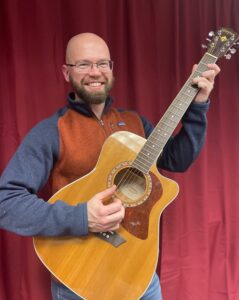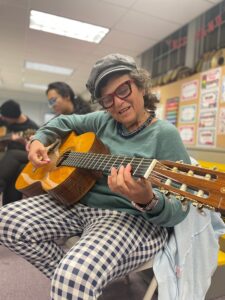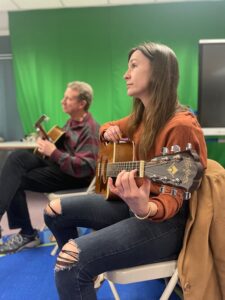In Wellfleet Elementary School’s basement music room, five adults sit strumming guitars, led by their teacher, Austin Smith. “Was anyone able to get a little practice in this week?” Smith asks. “Anyone hurt their fingers while playing?”

One minor injury is reported. The students turn to each other, comparing blisters. It’s Tuesday, and this is the third meeting of the Wellfleet Recreation Dept.’s “Introduction to Guitar for Adults,” taught by Smith. The class, advertised for ages 18 to 100, runs weekly through Feb. 11 from 5 to 6 p.m., and may continue for another six-week session after February break, Smith says.
Smith studied composition at Berklee College of Music, where he got a bachelor’s degree, and UMass Amherst, where he got his master’s. Like most working musicians, he incorporates teaching into his career. He started teaching guitar five years ago while working at the Merry Melody Music Academy in Boston. Two years ago, after moving back to Truro, where he grew up, he began giving private lessons to kids and adults on the Cape. This is his first time leading a group class for Wellfleet Rec.
Smith always asks his students what kind of music they’re interested in. “If it’s popular music,” he says, “we can usually make a simplified version of it or flat out play it.”
Sitting in a semicircle, the students put chord sheets on music stands. The first tune they’ll work on is by the Beatles: “Let It Be.” At Smith’s instruction, the group plays a C major chord together. Then G major. Mistakes are made — people strum out of time and pluck the wrong strings. But slowly and surely, the group settles into the song’s repetitive chord progression.
“Tons of popular music is built out of four chords,” says Smith. The basic chords might not seem exciting on their own, he says, “but if I’m doing my job as a teacher, I can accompany them.” Over his students’ steady strums, Smith improvises and embellishes a melodic top line.

“All of a sudden,” he says, “that very simple progression is shown in a context where it can really come to life.”
While simple pop songs might dominate Smith’s class, in his own work he moves between styles. For his gigs he focuses on blues, jazz, and pop. In college, he played a lot of jazz. Currently, he’s working on a string quartet. His compositions are “steeped in 20th-century influence,” he says, inspired by Béla Bartók and Luciano Berio. Last fall, a commissioned violin duet by Smith was performed at the Five College New Music Festival at UMass Amherst, and his quartet for piano, percussion, saxophone, and electric guitar was performed by the Hypercube Ensemble at one of its workshops.
Smith instructs the class from the center of the room; at other times, he goes from student to student, moving their fingers on the fretboard, helping them one on one. Learning an instrument is “a patient activity,” says Smith. “That can be tricky in a world where we’re always trying to make stuff go faster.”
The group struggles with the F major chord, which involves barring a finger over two strings. “The F chord breaks a lot of people in the first days of guitar,” Smith says. But the atmosphere in the classroom isn’t tense. Instead, people laugh and complain openly.
Occasionally, a student will play a dissonant chord. “Great chord, wrong fret,” Smith will call out. “That one had a little extra spice. That chord was funkified!”
After a short period of trial and error, Olaf Valli of Wellfleet plays a loud G chord correctly. “Let it ring, man!” says Smith.

“I want to challenge people,” says Smith. That’s why positive affirmation is so important. “A fun environment that’s also challenging is the perfect combination.”
The class moves on to chords for the song “Mad World” by Tears for Fears, then “Someone Like You” by Adele. Smith keeps up the affirmations — “Good job, team,” he says after the group gets through a whole song with few stops. And they really are a team — neighbors turn to neighbors to share a tip or a commiseration.
The social aspect of the class is something that took Smith by surprise. “I had been thinking from this teaching angle,” he says. “But a lot of people have told me they like the social part of making music.”
John Gregory-Davis, who lives in South Yarmouth, has been trying to learn guitar for several years. “I’ve tried a few different teachers with little or no success,” he says. “Austin is amazing because he’s incredibly talented and yet so patient and willing to work with us at a basic level.”
Becky Rosenberg, the director of Wellfleet Rec, is also in Smith’s class. “He’s resonated with these folks, and I know they’ll continue to play,” she says.
“You’re all champions,” says Smith as his students pack up their instruments. In the next couple of weeks, he says, they’ll continue to learn simplified songs as well as how to restring their guitars. Over the course of an hour, the students have improved, whether they know it or not.
“Day to day, week to week, you might not feel it,” says Smith. “Then you try to sight-read a piece of music or play a chord, and all of a sudden, you can do it.”



